Paul Verhoeven’s Starship Troopers was unleashed in theaters during the fall of 1997. The adaptation of Robert A. Heinlein’s Sci-Fi novel revolving around militarism was not a trailblazer at the box office or victor with the critics. However, the film garnered more resonance with the benefit of hindsight and age.
The Verhoeven staples of bulking violence laced with burlesque like social commentary were clear and present. Ever the bombastic auteur, Verhoeven truly showcased a cautionary tale for humanity. That tale warned of a fascist society dictated by unhinged militarism based on their imposing strength. Here are the Top 10 Moments In Starship Troopers.
Propaganda Video Packages
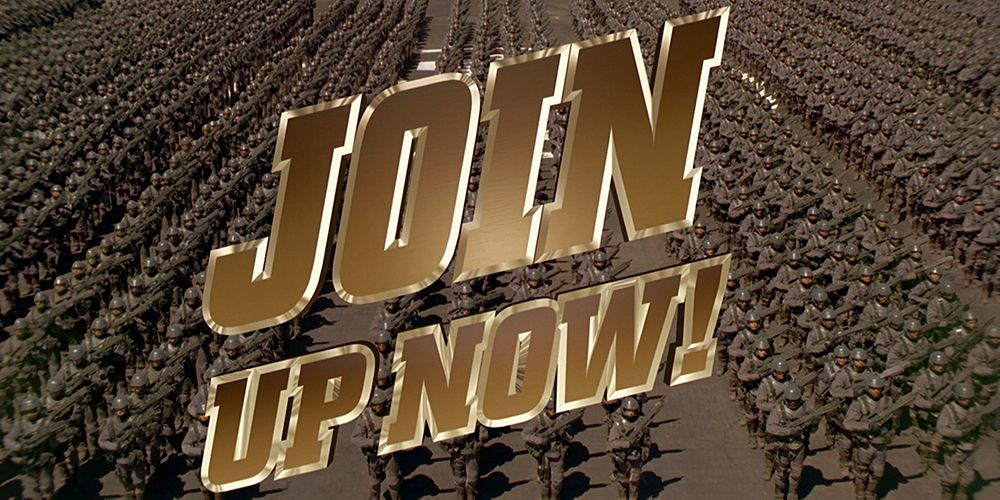
A framing device that welcomed the audience into the world of Starship Troopers was the propaganda video packages. These packages came in forms of military recruitment advertisements, talk-show excerpts, and news stories. The recruitment advertisements showcased a bias towards the United Citizen Federation. The mission was to deliciously cater to civilians the notion of military enlistment.
The glitzy presentation, along with the promise of citizenship, was another means of social brainwashing to the average civilian. The repetitive message loomed over the civilians. So much so that it subdued many into military enrollment. Do your part. Do your part. Do your part.
Cycle Of Death
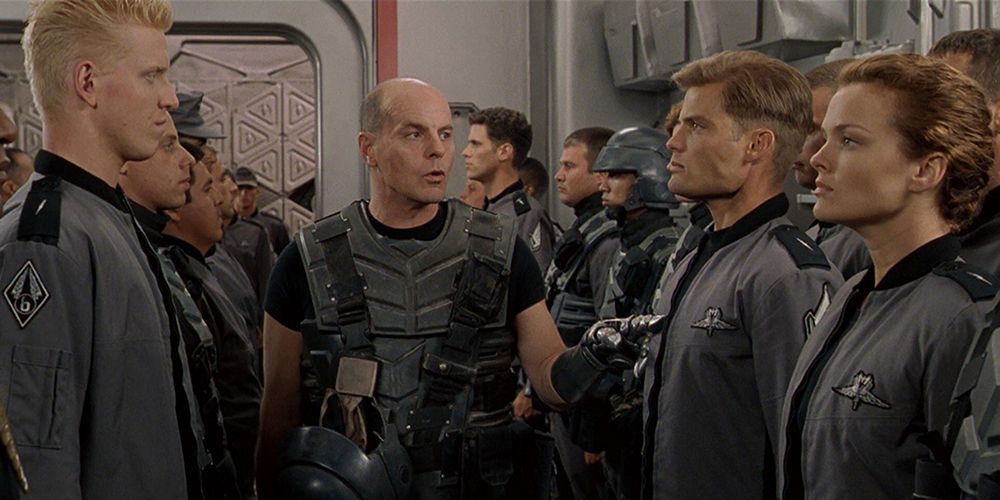
The United Citizen Federation could be summed up as Samsara, the cycle of death and rebirth. In the case of Starship Troopers, it was a much more vicious cycle based on the extraction of individualism.
Every citizen served the state, died, and was ultimately replaced. People were not people. They were cogs that could be easily swapped out in this militarized machine. Every death spawned a rebirth in service of the state. Every individual followed in the footsteps of their propagandized predecessor. This society thrived on the need for an enemy to infiltrate, pulverize, and dominate. That display of power dehumanized every person caught in the crossfire and doomed their future.
Missing Teeth, Same Smiles
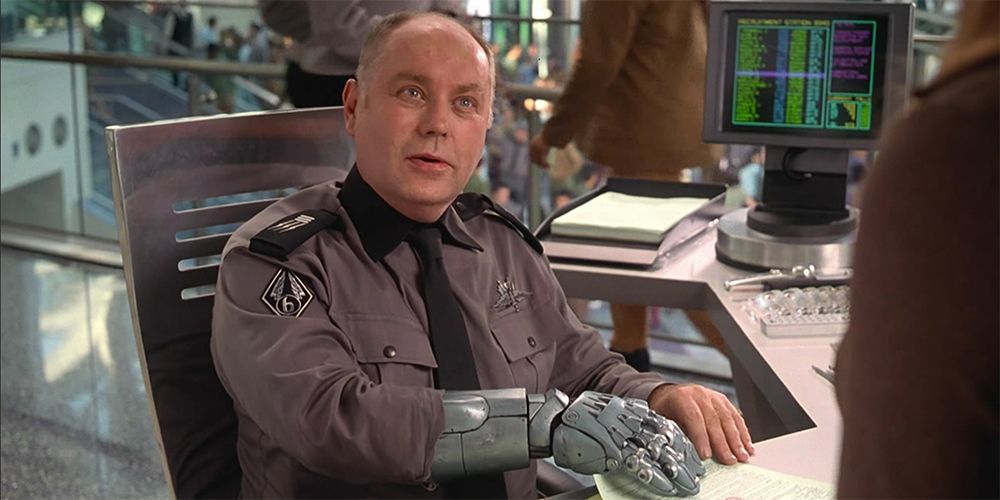
One of the most impactful storytelling elements within Starship Troopers was the use of irony. Verhoeven inserted this element within supporting characters to aid in the world-building of the film. These characters were the veterans of the United Citizen Federation. Limbless, handicapped, and traumatized veterans were littered throughout the film as new young recruits were mentored by them.
Audiences would expect that these veterans would succumb to realistic reactions to their predicaments like depression, lamentation, or resiliency. However, these veterans boast about their service, scars, and their delusional sense of righteousness. Their smiles remained massive, no matter how many teeth they continued to lose.
Johnny Rico
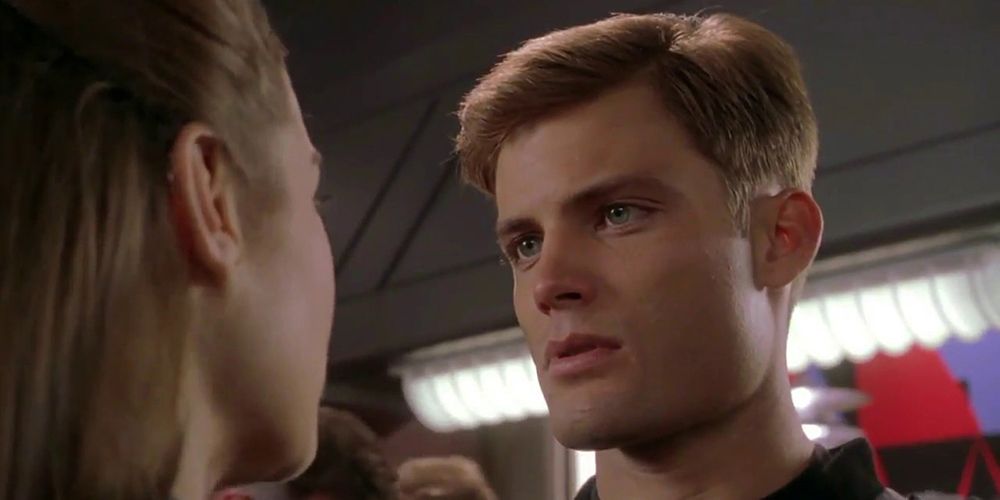
Starship Troopers’ protagonist was that of Johnny Rico, portrayed by Casper Van Dien. The role of Rico was played almost as a blank slate that was extremely impressionable. That pitiful character trait was what led to his mental downfall.
At the inception of the film, Rico showcased a shred of humanity by questioning his professors regarding the difference between a free civilian and a militarized citizen. As the film progressed, that shred of humanity succumbed to the brutality of the society he lived in. Compassion and choice were overshadowed by force and duty. Rico’s vulnerability and lack of resiliency made him an easy target for this society to claim.
Youth Vs. Age
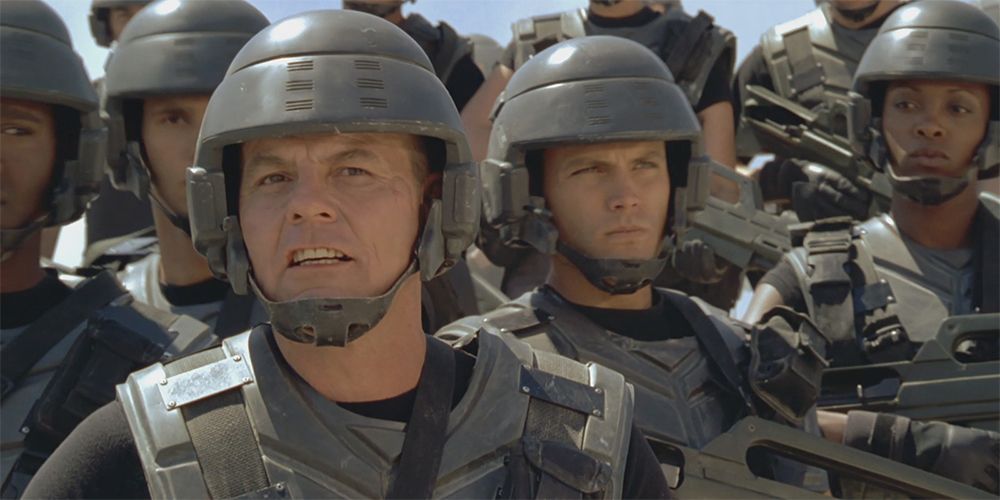
Verhoeven managed an exhibit of generational strife within Starship Troopers. That chasm of eras was on display full force. As aforementioned, Rico questioned his professors at the start of the film and was chastised for it. That ridicule resonated throughout the film as adults backhanded and buried any form rebuttal from the youth. Any lesson taught by a superior was automatically taken as sage seminars to life within society.
The habitual lessons of “Violence Solves All” were branded into young minds that had no chance to think for themselves. The essence of free thought was scoffed, severed, and smoldered.
Biology Dissection
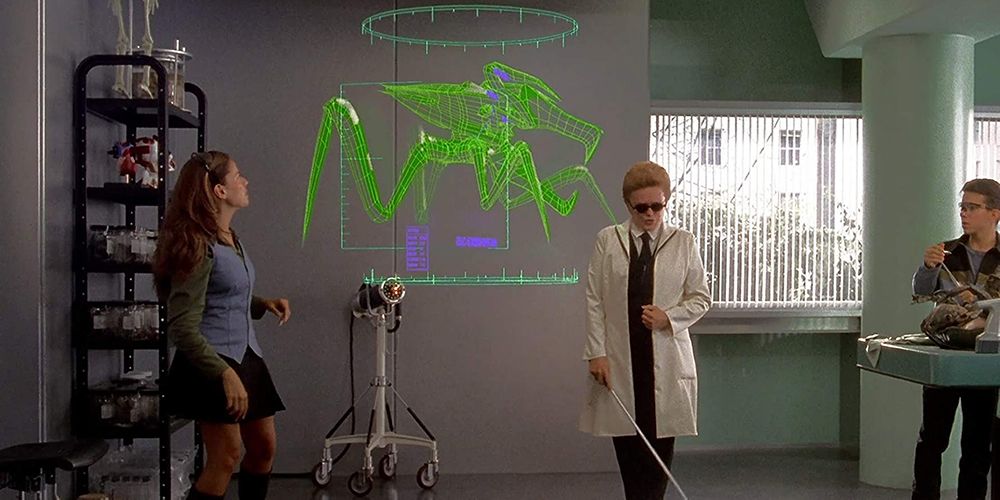
The sly subtext was an element that bubbled beneath the scenes within Starship Troopers. Rue McClanahan of Golden Girls fame portrayed a blinded and domineering biology professor. Her minor scene was one not to be ignored due to the context of it. She professed that the bugs were a superior species to humankind.
The kicker to that statement was that the bugs’ sole existence was to colonize other solar systems. Carmen Ibanez, a student, interjected with the fact that humans had created art, mathematics, and interstellar travel. The sightless teacher responded with the notion that dominance conquers all. The biology professor could only wish that humans were as singular minded as the bugs were.
Service Guarantees Citizenship
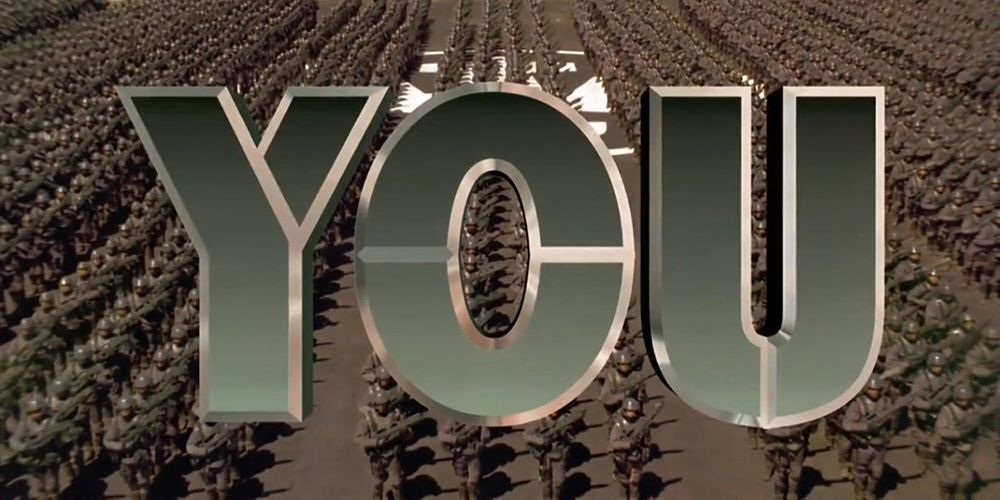
A foreboding sense of patriotism lingered over Starship Troopers. That presence clasped onto society’s throat with an iron fist. Regular civilians were differentiated from hardened citizens. This social schism was in part due to the concept of natural rights being a battled privilege rather than a given birthright. This led to the notion of bribing patriotism from civilians.
Serving the United Citizen Federation guaranteed citizenship. These guarantees included the right to vote. However, that right to vote was not seen as an expression of political opinion. It was used to display political authority. Within this society, something given had no value. Things of value had to be fought for or forced upon.
Who Made Who?
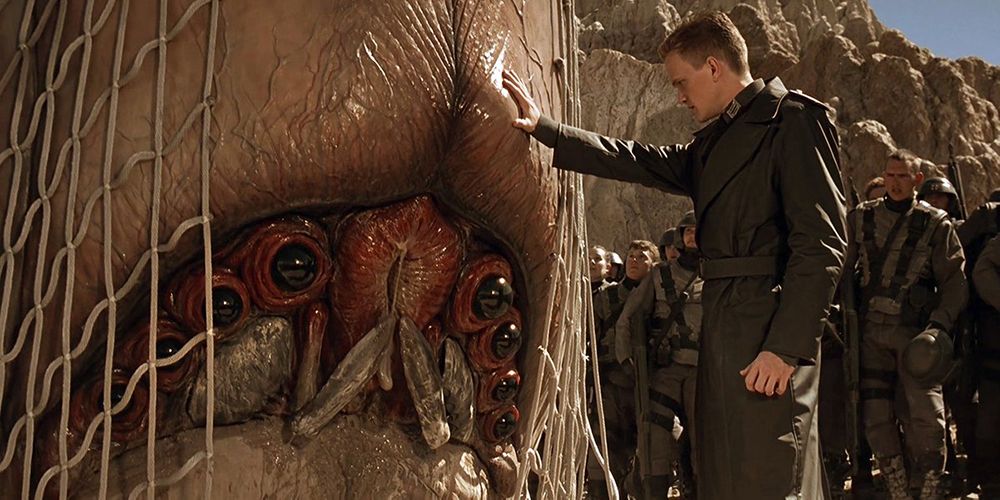
The planet of Klendathu, aka Big K, was inhabited by an array of insect species. Humans attempted colonization of Big K and were met with vicious resistance. However, the mentality of the bugs was that of defense. Their territory was invaded by a violent intruder, and they sought to protect themselves. Perception was truly reality regarding the world built in Starship Troopers.
The merciless conditioned human society could be considered more barbaric than the natural defensive instinct of the insects. It matters not who was the aggressor in this situation. One party prided themselves on being the aggressor…the humans.
Michael Ironside as Jean Rasczak
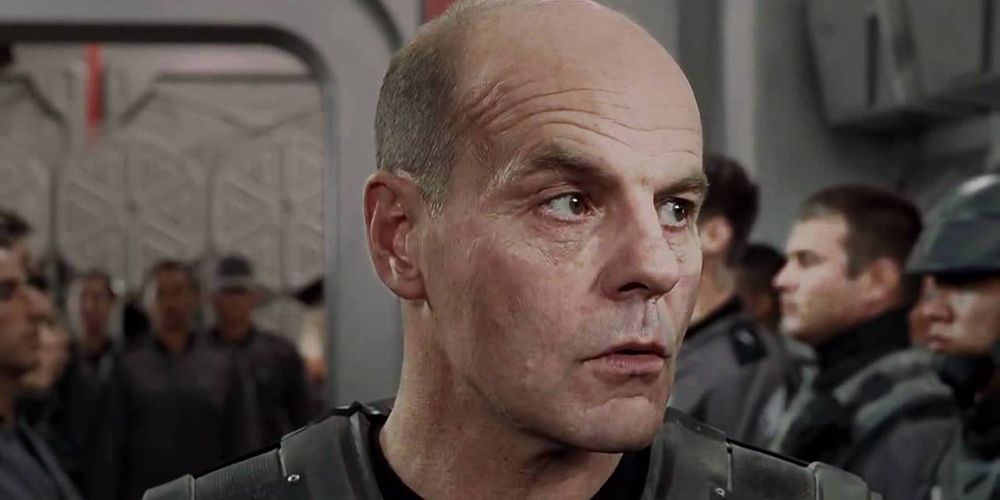
The embodiment of the federation’s fascist mentality was solidified in Michael Ironside’s dominant performance as Jean Rasczak, school professor and leader of the Roughnecks squad. Rasczak professed the notion that democracy was a fool’s dream and that anything given had no value. He stomped out any sense of benevolence and replaced it with lessons about force bringing all solutions.
His granite demeanor, along with his grizzled veteran wounds, allowed his influence to extend immensely. This hardened individual became Rico’s mentor in the worst manner. Rico soon replaced Rasczak as commander of the Roughnecks. Even worse, he now mirrored Rasczak.
Unchained Militarism
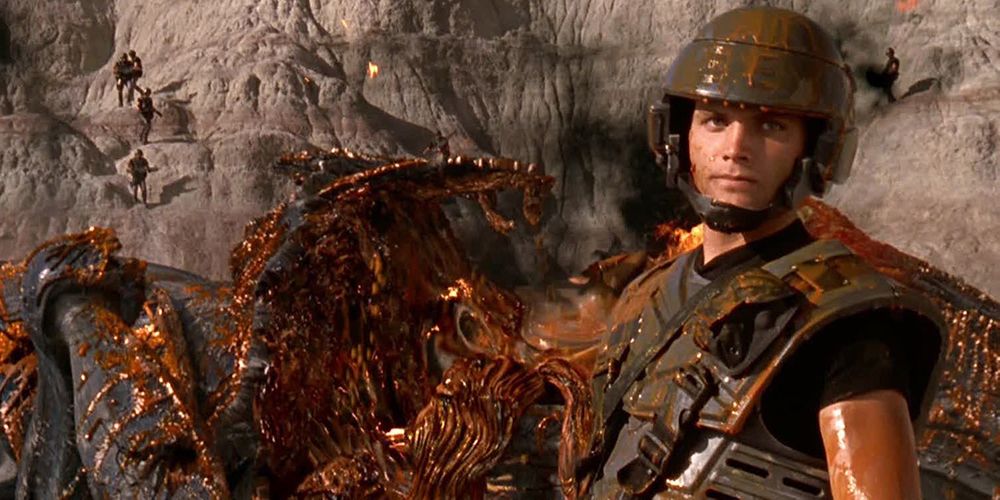
The coat of Starship Troopers was not the bombastic bloody bug battles or the high school melodrama. The established facet to be commended was the social warning of fascism. Starship Troopers showcased that an overemphasis on power is not a path to pave. Within this film, citizens were stripped of their individuality, brainwashed, and enslaved by an unchained militarized culture.
The loss of free thought, expression, opinion, and life was what resulted. Johnny Rico along with his contemporaries, became yet another generation of casualties within this fascist society. Paul Verhoeven encapsulated this anti-fascist idea within a Sci-Fi action film that could be considered a propaganda ad for the United Citizen Federation. The film itself was the message.




